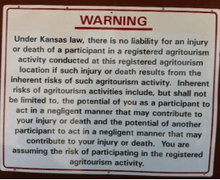Agritourism
Agritourism or agrotourism involves any agriculturally based operation or activity that brings visitors to a farm or ranch.


Types
A 2018 article published in the Journal of Agriculture, Food Systems, and Community Development classified agritourism activities as falling into one or more categories: direct-to-consumer sales (e.g., farm stands, u-pick), agricultural education (e.g., school visits to a farm), hospitality (overnight farm stays), recreation (e.g., hunting, horseback riding), and entertainment (e.g., hayrides, harvest dinners).[1] Most agritourists spent time visiting farm stands, picking fruit, or feeding animals; others may navigate a corn maze or do a farm stay, assisting with chores or agricultural or ranch work.[2]
Economic benefits
Agricultural tourism has become a necessary means for many small farms’ survival. By diversifying business operations, farm operators are able to ensure a more stable income. This is because agritourism activities can occur during times of the year that crops may not be in season, and by providing a completely separate stream of income.[3] Some studies have found that agritourism operations often benefit their surrounding communities by drawing tourists to the area. The economic boost by the increase in traffic can be beneficial to rural areas in need of diversified streams of income.[4]
Agrotourism in various countries
- Italy
Since 1985 agritourism in Italy is formally regulated by a state law,[5] amended in 2006.[6]
- United States
Through the Small Farm Center at the University of California, "Agricultural tourism or agritourism, is one alternative for improving the incomes and potential economic viability of small farms and rural communities. Some forms of agritourism enterprises are well developed in California, including fairs and festivals. Other possibilities still offer potential for development".[7] The UC Small Farm Center has developed a California Agritourism Database that "provides visitors and potential entrepreneurs with information about existing agritourism locations throughout the state".[8]
- United Kingdom
According to a 2011 article in the journal Tourism Planning and Development, agritourism has become economically important to the agriculture sector in North West England, as farmers seek to diversify their income streams.[9]
See also
- Agricultural show
- Ecotourism
- Enotourism (wine tourism)
- Geotourism
- Guest ranch (dude ranch)
- Rural Ramble
- Rural tourism
- WWOOF - 'Willing Workers on Organic Farms'
- You-Pick and Pick-Your-Own
References
- Chase, Lisa C.; Stewart, Mary; Schilling, Brian; Smith, Becky; Walk, Michelle (2018-04-02). "Agritourism: Toward a Conceptual Framework for Industry Analysis". Journal of Agriculture, Food Systems, and Community Development. 8 (1): 13–19. doi:10.5304/jafscd.2018.081.016. ISSN 2152-0801.
- Biuso, Emily. "Down on the Farm With Your Sleeves Rolled Up".
- Khanal, Aditya; Mishra, Ashok (2014). "Agritourism and off‐farm work: survival strategies for small farms". Agricultural Economics. 45 (S1) – via Wiley Online Library.
- Barbieri, Carla; Sotomayor, Sandra; Aguilar, Francisco (2017). "Perceived Benefits of Agricultural Lands Offering Agritourism". Tourism Planning and Development. 16 (1): 43–60.
- Law N. 730, year 1985
- Law N. 96, year 2006
- "Agritourism Davis, California: University of California, Small Farm Center". December 30, 2008.
- "California Agritourism Database Davis, California: University of California, Small Farm Center". Archived from the original on January 15, 2009. Retrieved December 30, 2008.
- Chris Phelan & Richard Sharpley, Exploring Agritourism Entrepreneurship in the UK, Tourism Planning and Development, 8(2): pp. 121-136 (May 2011).
External links
| Wikivoyage has a travel guide for Agritourism. |

- "Agritourism Safety - Integrating Safety into Agritourism". Integrating Safety into Agritourism. Retrieved 2016-02-18., an online resource developed by the National Children's Center for Rural and Agricultural Health and Safety (NCCRAHS) in 2007.
